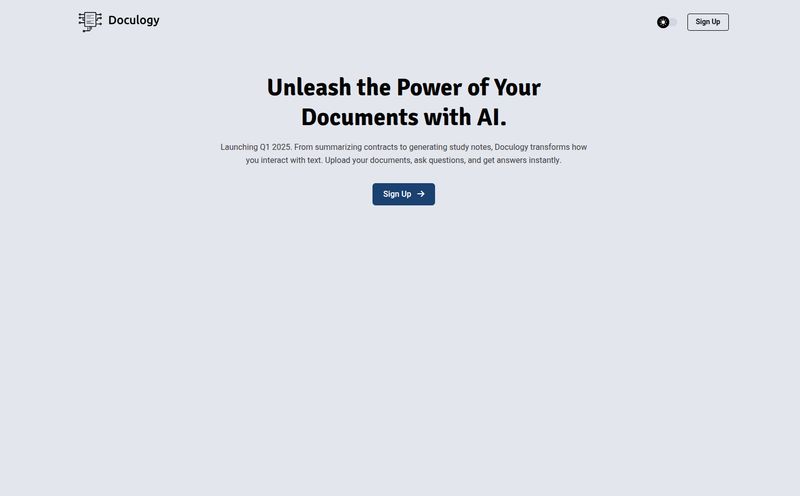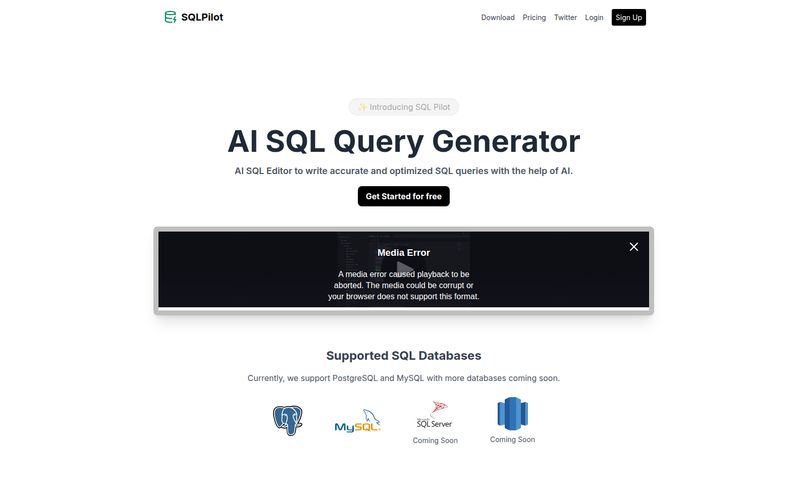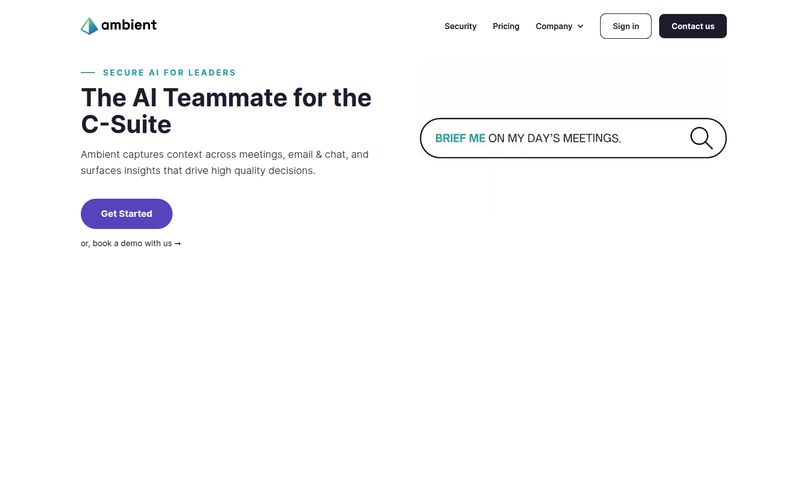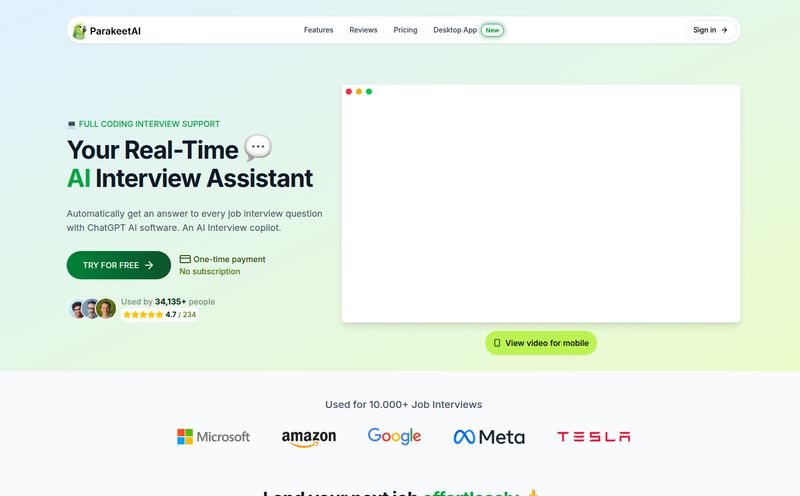If you've ever been in a research environment, you know the feeling. Stacks of notes, data spread across a dozen different spreadsheets, and that one crucial observation scribbled on a napkin you think you left in your other lab coat. Managing R&D data can feel like trying to build a LEGO masterpiece in the middle of a hurricane. It’s organized chaos on a good day.
So, whenever a new tool pops up promising to fix all that with the magic sprinkle of “AI,” my inner skeptic and my inner optimist get into a fistfight. The latest contender to step into the ring is a platform called LabNote. Their website is sleek, the promises are big, and they’re targeting the heavy-hitting fields of biotech and nanotech. But is it just another pretty face in the crowded world of SaaS, or is there some real substance here? I decided to take a look.
So, What Exactly is LabNote?
Stripping away the marketing jargon, LabNote positions itself as a complete research note and data management solution. Think of it as an Electronic Lab Notebook (ELN) that's been hitting the gym and taking some serious AI supplements. It's a cloud-based platform designed specifically for BT (Bio Tech) and NT (Nano Tech) researchers and organizations. The whole idea is to get you out of the weeds of data wrangling and back to the actual, you know, research.
They’re not just blowing smoke either. A quick look at their site shows a pretty significant mention of a memorandum of understanding (MOU) with Merck, the pharmaceutical giant. In our industry, a partnership like that isn't just a handshake; it’s a massive vote of confidence. It suggests their tech has been vetted and deemed worthy by people who don't mess around.

Visit LabNote
The Core Features That Actually Matter
Any platform can have a long list of features, but only a few usually make a real difference in your day-to-day workflow. Here’s what stood out to me about LabNote.
From Scattered Text to Structured Genius
This is the one that really got my attention. LabNote claims it can take your raw, unstructured text—think stream-of-consciousness notes you type out during an experiment—and automatically convert it into structured, organized lab notes. If this works as well as they say, it’s a game-changer. It’s like having a hyper-organized assistant who follows you around, tidying up your mental breadcrumbs into a coherent trail. For anyone who has ever tried to decipher their own notes from three months ago, the appeal here is massive.
An AI Research Assistant in Your Corner
The term “AI Assistant” is thrown around a lot these days, often meaning little more than a glorified search bar. LabNote’s version seems to be more ambitious. They talk about leveraging machine learning for a “new approach to experimentation.” What does that mean? The details are a bit fuzzy, but I imagine it could involve suggesting next steps, identifying patterns in your data that you might miss, or even flagging potential inconsistencies in your methodology. It’s an exciting prospect, but one I’d need to see in a demo to fully grasp.
A Central Command for Your R&D Data
At its heart, LabNote is a robust data management system. This is the bread and butter. It provides a single source of truth for all your research data, notes, and protocols. In an era where reproducibility and data integrity are everything, this is non-negotiable. Having everything on one trusted, open cloud platform means better collaboration for teams and peace of mind for Principle Investigators. No more hunting for that one critical file on someone’s local drive.
The Good, The Bad, and The 404 Error
No tool is perfect, right? I’ve been in this game long enough to know that you have to weigh the shiny promises against the practical realities. My two cents on LabNote is that it has a ton of potential, but there are a few things to keep in mind.
On the plus side, the platform seems incredibly comprehensive. It’s not just a notebook; it’s an entire research ecosystem. The focus on biotech and nanotech is also a huge advantage, as generic solutions often miss the specific needs of these fields. And of course, being cloud-based means you can access your work from anywhere, which is just standard expectation in 2024.
However, there are a few hurdles. Any powerful tool is going to have a bit of a learning curve, and I suspect LabNote is no different. You’ll likely need to invest some time to get the most out of it. The bigger issue for me, though, is the lack of transparency. The specifics on the AI’s capabilities are a little vague for my taste. But the most glaring ommission? The price. I went looking for a pricing page, clicked the link... and was greeted by a big, bold 404 ERROR. This page isn't available. Oof. That's a bit of a turn-off. It’s a classic enterprise software move—force you to “Contact Sales” for a demo and a custom quote. It makes sense for large organizations, but it's a barrier for smaller labs or individual academics who just want to know if it's even in the ballpark of their budget.
Who Is This Really Built For?
Based on their website and the various products mentioned—Labnote Scholar, Labnote Preclindoc, and the main Labnote—it looks like they’re trying to serve a few different segments of the research community. I'd speculate that:
- Labnote Scholar: Is likely geared towards academic researchers and university labs.
- Labnote Preclindoc: Seems tailor-made for biotech and pharma companies managing pre-clinical trial data.
- Labnote (the main platform): Probably serves as the core solution for general R&D departments in larger corporations.
This segmented approach is smart. It shows they understand that a one-size-fits-all solution doesn’t really work in the complex world of scientific reseach.
Final Thoughts: Is LabNote the Future?
So, what’s the final verdict? I'm cautiously optimistic. LabNote is making some very bold claims, and the AI-driven features, especially the text-to-structured-note conversion, could genuinely revolutionize how researchers work. The partnership with Merck adds a heavy dose of credibility that’s hard to ignore.
That said, the lack of public pricing and the slight vagueness around the AI’s exact functions are points of friction. It feels like a platform with immense power that's kept behind a bit of a curtain. My recommendation? If you're in a biotech or nanotech R&D team and you're drowning in data, LabNote is absolutely worth putting on your shortlist and booking a demo for. For the solo researcher or small lab, the initial effort to get a price might be a bit of a deterrent. It’s a tool to watch closely as it could very well be a glimpse into the future of the digital lab.
Frequently Asked Questions
What is LabNote in simple terms?
LabNote is an advanced digital lab notebook and data management platform for scientists in biotechnology and nanotechnology. It uses AI to help organize notes, manage data, and streamline the entire research process on a single cloud-based system.
Who should use LabNote?
It's designed for individual researchers, academic labs, and R&D organizations within the biotech and nanotech sectors. They offer different solutions that seem to cater to everyone from university scholars to large pharmaceutical companies.
What makes LabNote different from other Electronic Lab Notebooks (ELNs)?
Its primary differentiator appears to be its AI integration. Features like converting raw text into structured notes and the promise of an AI research assistant go beyond what many standard ELNs offer. Its specific focus on BT/NT is also a key distinction.
How much does LabNote cost?
That's the million-dollar question! Currently, LabNote does not have public pricing information available on their website. You need to contact their sales team to get a quote, which is typical for enterprise-level software.
Is LabNote's partnership with Merck significant?
Yes, very. An MOU (Memorandum of Understanding) with a global pharmaceutical leader like Merck lends significant credibility to LabNote's technology and its potential impact on the industry. It suggests their platform is robust and valuable for serious R&D work.
Can I use LabNote if I'm not in biotech or nanotech?
While the platform is heavily optimized for biotech and nanotech workflows, its core data management and note-taking features could potentially be useful for other scientific fields. However, you'd get the most value if you're within their target industries.
Reference and Sources
For further information and to explore the platform yourself, you can visit the official website:



